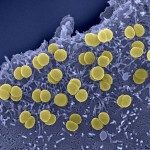Link to Pubmed [PMID] – 27357022
Epidemiol. Infect. 2016 10;144(14):3052-3057
The Global Meningococcal Initiative (GMI) is an international group of scientists and clinicians with recognized expertise in meningococcal disease including microbiology, immunology, epidemiology, public health and vaccinology. The GMI was established to promote the global prevention of meningococcal disease through education, research and international cooperation. The GMI held its second summit meeting in 2013 to discuss the different aspects of existing meningococcal immunization programmes and surveillance systems. Laboratory confirmation and characterization were identified as essential for informing evidence-based vaccine implementation decisions. The relative merits of different confirmatory methodologies and their applications in different resource settings were a key component of the discussions. This paper summarizes the salient issues discussed, with special emphasis on the recommendations made and any deficiencies that were identified.

